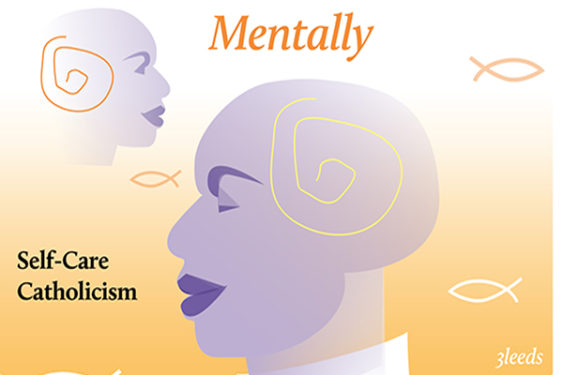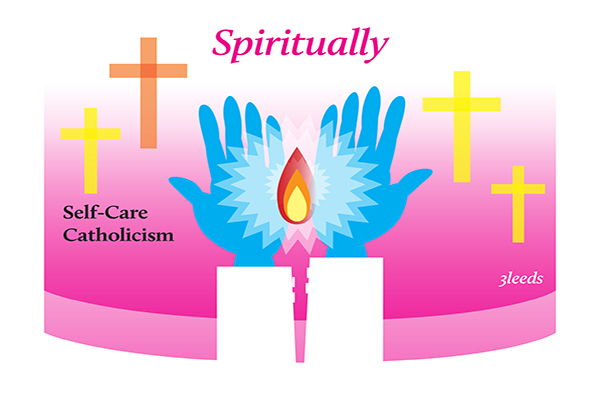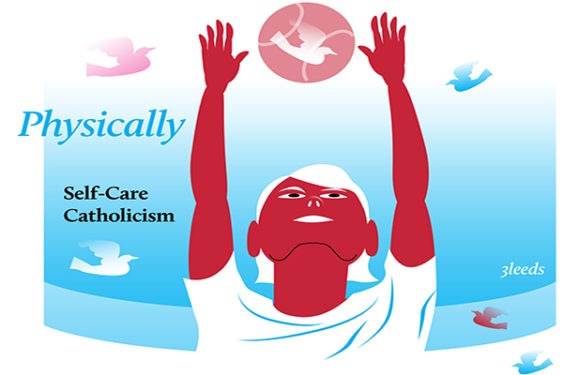

MENTAL SELF-CARE
By Christina Sama-Bommarito, M.A.
In 2018, I began to conduct research on how to teach our students to cope with their issues and/or how to simply begin the day feeling more relaxed.
I discovered scientific evidence conducted through randomized control trials (RCTs) and MRI (brain scan) studies, which found that when practiced consistently, mindfulness meditation has the power to alter the structures and functions of the brain to reduce levels of stress, improve physical and mental health, increase cognitive performance, and overall show greater well-being.
Quiet Your Mind: Meditate
Another form of self-care is meditation. Meditation is a practice in which individuals use techniques that allow them to quiet their mind. It has been scientifically proven to increase resilience to stress as well as focus and concentration.
At its core, meditation allows you to become more aware of what you are thinking and how to deal with your thoughts as they wander.
Some techniques that may assist you with meditation include deep breathing exercises, muscle relaxation exercises and guided imagery. Other forms of meditation include prayer and physical exercise.
Breathing Exercises
According to Dr. Andrew Weil, M.D., world-renowned leader and pioneer in the field of integrative medicine, an example of a breathing exercise for beginners is simply counting your breaths.
Sitting in a comfortable position in a safe space with your eyes closed, begin by taking a few deep breaths, inhaling through your nose and exhaling through your mouth. Allow your breathing to be natural without trying to influence it.
To begin the exercise, count “one” to yourself as you exhale. The next time you count “two” and so on up to “five.” Then begin a new cycle.
Every time you lose count or find your attention has wandered, simply start again from the beginning. Try to do three to five minutes of this form of meditation every day.
Peaceful State of Being Present
Another technique is guided imagery. Anxiety is brought on by our thoughts and experiences. We have tendencies to dwell on memories, relieving them over and over like an addiction to thoughts. We also have tendencies to chase our future by attempting to control time by planning and hoping. Remember, all we can control is this present moment.
Through guided imagery, you can train your mind to be in the present moment by thinking about a peaceful place in your life, whether real or imaginary. Create details about this place in your mind. Visualize the sights, sounds and smells of this place. Remember, this place is available for you when you need a break. Encourage yourself that you deserve time out of the hectic life you lead and any related frantic thinking. Remember your Catholic faith will guide you through the most difficult times.
Sama-Bommarito is a counselor with the Program for the Development of Human Potential (PDHP) at The Mary Louis Academy, Jamaica Estates.

SPIRITUAL SELF-CARE
By Allyson Escobar
Though often associated with yoga mats and bubble baths, self-care also has to do with the spiritual — just ask a millennial priest or reporter.
Father José Diaz, a 29-year-old parochial vicar at St. Leo’s parish, Corona, defines spiritual self-care as “addressing the matters of the heart.”
“When we understand where our heart is, that’s where we truly acknowledge and focus on self-care,” Father Diaz says. “Self-care is saying, ‘Lord, I trust in You. When we do that … it is evidence for faith, the things that are unseen. Faith is the fruit of an encounter with Jesus, and so my faith is in the one who knows my heart.”
Spiritual self-care is related to the mental, physical and social. It’s the invisible glue that holds everything together. Father Diaz said that it should be the center of one’s life.
“Self-care begins with me acknowledging my need for the Lord, and my need to acknowledge the matters of the heart, whether it be in my understanding or not.”
In an age of social media and technology, millennials — overloaded with the pressures of figuring out their careers, vocations, families and finances — tend to look for ways to escape and instead end up burning out. Father Diaz suggests looking inward “at the root of the situation, and saying, ‘Where is my heart? Why am I feeling this way? Is it because I’m overloaded at work, or do I feel a certain way because of my broken relationships?’” he said. “If we don’t address [the] heart, it’s like escaping, ripping on and off a band-aid, over and over again.”
He said practicing self-care is important for him as a young priest, whether it’s hanging out with fellow clergy or listening to hip-hop music to unwind. Daily reading and breathing exercises help him focus on his vocation and daily parish responsibilities, he said.
For me, as a Catholic millennial living during a time where gun violence is rampant and the Catholic Church is in crisis, things can seem a little hopeless. Cultivating a healthy prayer life is my spiritual self-care — that means going to Sunday Mass and adoration and receiving spiritual direction when I can.
Community Is Key
Another important aspect of spiritual self-care is finding community, Father Diaz said.
The hardest part about being a young adult Catholic today is finding a like-minded group — especially in a big city like New York, where many diocesan programs cater to just children or adults. Young adult Catholics often lack a sense of belonging. Praying and participating in the sacraments are ways to practice and develop strong spiritual self-care.
“If we trust the direction of the Holy Spirit, things are made clear,” Father Diaz said. “In a sense, self-care is really self-less. If I am selfless, that’s self-care — because the one who’s caring for me is the Lord, He who abides in me.”
Being in New York City alone, I have found that a countless number of parishes offer Adoration, including many in Brooklyn and Queens. Here, I can spend time alone with God to share with Him my doubts and frustrations and just be. Here, my spirit is renewed and my soul is free.
“Too many people come to Jesus treating Him like a vending machine for our prayer requests, but that’s not our faith. Our faith is the realization that we are loved and that we are called to relationship.”

PHYSICAL SELF-CARE
By Melissa Enaje
As someone who grew up playing sports, I always considered physical health integral to my overall health.
In high school, I stayed active as an athlete, which helped me balance my mental health. Even though the schoolwork and extracurricular activities were a handful, it was manageable because I always spent at least an hour every day working out or doing drills.
But as an adult, I find my different responsibilities and fast-paced lifestyle are always in competition with my “physical” self-care. I believe physical health affects mental health and spiritual health — all three aspects are important and connected. If I’m ignoring my physical and mental health, how can I expect my spiritual health to flourish when my mind is bombarded with constant thoughts?
My research for self-care Catholicism needed an expert, and I found one during a yoga class for young adult Catholics.
I’ve taken all kinds of yoga classes before — from hot yoga where we’re in a room that heats up like a sauna to yoga on the beach. I wasn’t sure what to expect with a yoga class for Catholics. So when I met instructor Evelyn Hoelscher, a contemporary dancer and choreographer who also teaches yoga, Pilates and other fitness classes, she affirmed my belief that physical, mental and spiritual health are connected.
Temple of the Holy Spirit
“As Catholics, we believe that the body is not disconnected from the spirit, but that it’s one,” Hoelscher said. “So if we’re only treating the spirit, we’re neglecting an entire part of what we were created with. So I think that with me, I have grown in my faith since I started doing yoga because I’ve been paying attention even more to how to breathe, to how to connect with my body in that way.”
For at least an hour, the instructor took us on a meditative and physical journey through movements and poses. For the first time in my experience, I was doing a yoga class that incorporated Christian music in the background and prayer throughout the exercises. It was just what the doctor ordered.
“The goal of yoga they say is enlightenment, and enlightenment essentially is a connection with God,” she said. “It’s holiness. It’s the same thing, different language.”
Even if yoga isn’t your preference when it comes to taking care of yourself physically, try doing something as simple as taking a walk outside and being present in the moment. A 30-minute walk outside while observing the details of your environment is a kind of mindfulness that goes hand in hand with physical activity. The point is to get your heart pumping instead of being stagnant. I find walks with my dog as healing as a cup of hot tea on a cold day.
The goal is to incorporate a physical activity that speaks to your soul — the very soul that our Creator made in the image and likeness of Himself. One last thing to remember: rest is as important as activity. We must be able to reset our batteries before we run on empty.